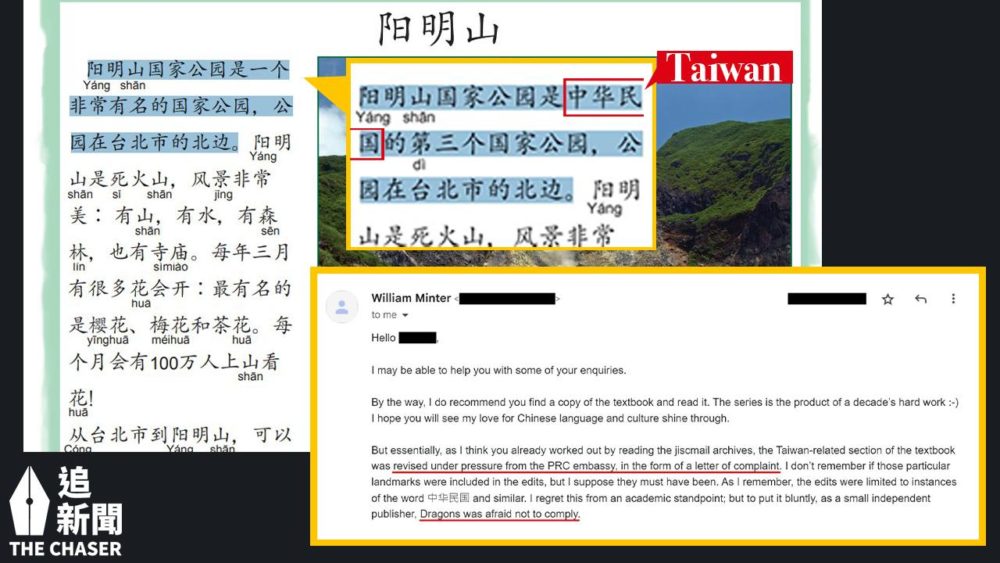
The Chinese embassy in London has ‘pressured’ a publisher to redact Taiwan’s official name from a widely-used GCSE Chinese textbook, the Chaser News can reveal.
A reference to “Republic of China” — the island’s formal designation under its constitution — in a Taiwan-themed chapter was removed by the UK-based publisher Dragons Teaching after Chinese officials lodged a complaint in 2018.
The phrase appeared in a Chinese-language excerpt about the Yangmingshan National Park, originally described as “the Republic of China’s third national park” in the 2016 first edition of the exam board-approved AQA GCSE Chinese Textbook 1.
Citing concerns over academic integrity, William Minter, who authored the book shortly after graduating from university, told the Chaser News he “regretted” the edit but nonetheless supported it as the publisher was left “afraid” of resisting.
China regards self-governed Taiwan a breakaway province and does not recognise any suggestions of its status as an independent state.
Mr Minter said: “The Taiwan-related section of the textbook was revised under pressure from the Chinese embassy, in the form of a letter of complaint.
“It was the publisher’s decision (to remove the phrase), but I supported it because I did not want the publisher to get into trouble.
“To put it bluntly, as a small independent publisher, Dragons was afraid not to comply.”
The contested text on page 188 of the book now reads: “Yangmingshan National Park is a well-known national park.”
Having entered into voluntary insolvency a year ago, the founder and former CEO of Dragons Teaching did not respond to a request to comment.
“Used in real life, in the real world”
Despite the historical strife across the Taiwan Strait, Mr Minter stressed his intention was to present pupils with a global outlook on the Chinese-speaking world through original source materials, and it had nothing to do with politics.
He said: “I wanted the students to understand Mandarin Chinese as it is used in real life, in the real world, for example, when they go travelling.
“The excerpt in question was adapted from a real brochure which contained this wording.”
Aside from Mainland China, materials from other areas with a Chinese-speaking majority like Singapore were also adapted in the book, he added.
The Chaser News is unable to locate any further mentions of “Republic of China” within the book’s first edition, which most of the time referred to the island as Taiwan or Taipei.
At least 40 government-funded schools in the UK use the book to deliver GCSE Chinese, freedom of information requests submitted separately to school authorities nationwide show.
Leah Russell, the other author specialising in the book’s illustrations, confirmed receipt of the letter of complaint to the Chaser News.
“Blatant threat”
The revelation comes against a backdrop of heightened scrutiny over how China projects its soft power abroad through education programmes, such as the 30 Confucius Institutes in UK universities.
Critics have accused the country of stifling dissent overseas, with the former Prime Minister Rishi Sunak once promising to shut all these institutes in a Conservative leadership election pledge he later reneged.
Dr Wong Wai Kwok, a scholar of cultural studies and political studies from Hong Kong, considered the “extremely serious” episode emblematic of Beijing’s growing attempts at “cultural infiltration and aggression” towards the West.
He said: “The Chinese embassy was coercing a UK publisher into self-censorship as a state authority.
“However, its blatant threat went unnoticed and was not picked up by any media outlets.”
Hong Kong authorities have clamped down on the city’s opposition parties, press, judiciary and the civil society at large over — what they say are, but often disputed — national security threats, after millions took to the streets demanding democratic reforms in 2019.
Now on a British National (Overseas) visa in the UK, Dr Wong believed academic independence in Britain was no better protected than his homeland, adding: “There is no shortage of takers when China offers money.
“But when China suppresses academic freedom, everyone turns a blind eye.”
Pressed on whether it was aware of the edit, AQA said it did not publish textbooks itself but considered any concerns carefully and talked to publishers.
The exam board’s GCSE Chinese specification has one mention of Taiwan under the theme of travel and tourism which it said focuses on “cultural and linguistic aspects rather than political statements.”
It added that “the UK government does not recognise Taiwan as a state.”
The Department for Education did not address questions over concerns for freedom of speech, but instead said it did not regulate the content of textbooks, and that their use in classrooms remains to be the responsibility of teachers.
The Foreign Office did not respond to the Chaser News’ request to comment.



